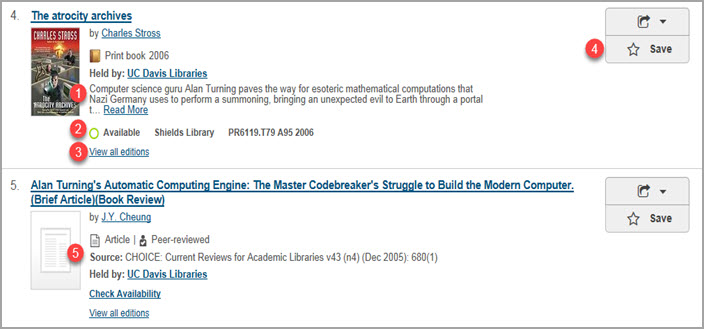WorldCat Discovery beta: User Experience Enhancements

This month’s WorldCat Discovery installation on August 29, 2016 included the following new features and enhancements.
The running list of release notes can be found at http://www.cdlib.org/services/d2d/melvyl/public/. (Note that many of these do not have an impact on Melvyl.)
New Features and Enhancements
- User experience enhancements. User experience is vital to successful end user journeys, and your feedback and commitment to library users surfaced clear opportunities to enhance their experience.

-
- Spotlighting the item’s summary and/or abstract to help users determine, “Why is this relevant?”
- Emphasizing the important question, “Where can I pick up this item?” that library users face.
- Presenting an action word with the item’s Editions and Formats. Demoting the link to align with the user’s need for description and availability status first.
- Accompanying the Save icon with its description to clarify the icon’s function.
- Highlighting the direct relationship between the piece of the item, and the item’s larger source.
- (Not Pictured) Broadening the button label to account for all online media types.
- (Not Pictured) Removing the database name from each item, and relocating it to the full item description for advanced users.
- (Not Pictured) Removing the “1 OF 1 AVAILABLE” flag because users could not reliably understand it.
- Relevance Only now focuses on known and recent items. The ‘Sort By’ option ‘Relevance Only’ will now have a new search relevance algorithm. Search engine innovation is an area of focus for WorldCat Discovery. This new relevance algorithm improves relevance for users by enabling successful known item and academically recent searches. Please note, the new algorithm is in WorldCat Discovery but is not in WorldCat Local.
Relevance Only now balances the following four weights in order of priority:
Date
The new Relevance Only algorithm places a greater emphasis on surfacing newer materials. Previously, the algorithm underweighted date, which inappropriately surfaced outdated resources.
Title
The title is the clearest, most visible indicator that an item matches a query. As a result, we have placed more emphasis on the title weight.
There are three components to the title weight. The weightings account for the number of words in the query relative to the title, the number of words in the title relative to the query, and the exact order that the words appear from the query in the title. When combined, the three weights provide a tight match from the query entered to the titles surfaced in the results.
Author
When a user queries a name, they expect to visually see the name in the search results. To this end, the same weighting method is used for author as in the title weighting.
Worldwide Holdings
Worldwide holdings are not a visual cue to the user, but the holdings help users find foundational literature. Worldwide holdings indicate relevance because libraries strive to ensure their collections are relevant to their users. Therefore, the items that have more holdings are more likely relevant.
Relevance Only now leverages the Worldwide Holdings weight to a lesser degree. This dampened weight helps to ensure a balance between less relevant items with numerous holdings and more relevant items with fewer holdings.
Examples
To illustrate the new algorithm, please see the following examples:
Please note, the search examples are dependent on selected databases and scoping levels, so the same search may not yield the same results at your institution.
Known Items
A user queried five takes on climate and cultural change with the old Relevance Only to find the known item Five Takes on Climate and Cultural Change in Tuvalu by Anne Chambers and Keith S. Chambers. Previously, the first result was an irrelevant book that happened to use the words climate, cultural, and change many times. Now, the new Relevance Only surfaces the known article title first.
A user queried on this day history with the old Relevance Only to find the popular state history books. Previously, the first result was a book from 1776. Now, the new Relevance Only surfaces On this day in Detroit history by Bill Loomis first.
Recent Research
A search with the old Relevance Only for the genetics of alcoholism yielded a 1992 print book titled The Genetics of Alcoholism by the National Institute on Alcohol Abuse and Alcoholism (U.S.). Since genetics is a prolific field, the new Relevance Only helps to surface a 2013 print book of the same title and author as the 1992 book.
Feedback
OCLC would appreciate hearing your feedback on the new algorithm. Your feedback will directly inform the next steps. Please post on the Community Center, which you can log in to using your WorldCat Discovery Staff account or WorldShare credentials.
- Provide access to MARC record with authentication at the point of need. The MARC record button is now visible to all users with both WorldCat Discovery and Cataloging subscriptions, but the MARC record is only accessible to staff. After pressing the MARC button, users may authenticate with their staff login and password to view the MARC record.

Bug Fixes
- Search landing page autofocuses on search box. The search box used to be the cursor’s primary focus of our landing page, and it now is again.
WorldCat Discovery (WCD)
OCLC is working on major changes to WorldCat Local: a new discovery interface with major functional and design improvements. WorldCat Local will be replaced by a new platform called WorldCat Discovery.
Information on the WorldCat Discovery (Beta) for the UC campuses is available on the WorldCat Discovery Beta webpage. This webpage includes
- Links to the UC campus (and union) WCD-Beta instances where you can test drive the functionality
- OCLC’s project timeline (e.g., when will UC migrate to the new platform?)
FirstSearch
In March 2016, OCLC announced it was keeping FirstSearch as a separate product rather than merging it into WorldCat Discovery as originally planned. We do not yet have a timeline for the new FirstSearch beta.
